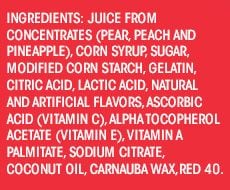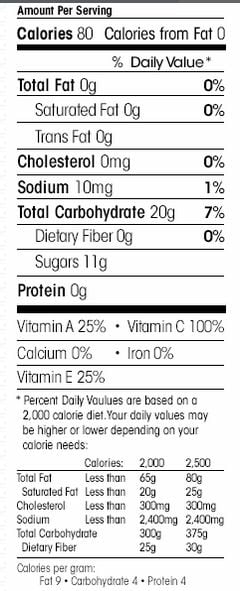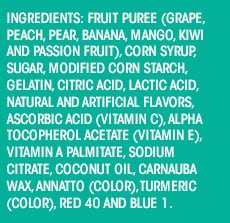In the complaint*, filed on Friday, plaintiffs Aliza Atik and Winnie Lau argue that the snacks – which they say contain “mostly a combination of corn syrup, sugar, modified corn starch, juice from concentrate, artificial flavors and dyes” – contain “minimal amounts” of the “vibrantly depicted” fruits on the label and “are no more healthful than candy”.
While the first ingredient in some of the snacks is juice from concentrates** the second, third and fourth ingredients are corn syrup, sugar and modified corn starch, says the complaint, which notes that the regular fruit snacks contain no fiber and 40%+ sugar (eg. the mixed fruit snack contains 11g sugar per 25.5g serving, or 43% sugar), while the PB&J snacks contain 53% sugar.
Meanwhile, the vitamins advertised on the front of the pack - which features the slogan ‘made with real fruit’ – are added to the snacks, and are not, as is implied, derived from the fruit, it says: "[The snacks are] devoid of the health benefits plaintiffs and other reasonable consumers associate with consuming real fruit.”
The plaintiffs add: “Welch Foods has deceived shoppers by engaging in a deceptive marketing campaign to convince consumers that Welch’s Fruit Snacks contained significant amounts of the actual fruits shown in the marketing and on the labeling of the products, were nutritious and healthful to consume, and were more healthful than similar products.”
Steve Gardner: ‘Basically, the fortification rule says not to add vitamins to crap’
Specifically, they allege, Welch’s is violating federal food labeling requirement 21 C.F.R 102.5*** by failing to display the percentage of fruit in the product name on the front of the label.
Welch’s is also violating the so-called ‘jelly bean rule’ enshrined in 21 C.F.R. 104.20, in which the FDA says it does not consider it appropriate to fortify “snack foods such as candies and carbonated beverages”, argues the lawsuit.
Asked whether the fruit snacks were the equivalent of 'candies', Stephen Gardner, who heads the food law practice at the Stanley Law Group of Dallas, Texas, and is representing the plaintiffs along with the Richman Law Group, told FoodNavigator-USA: “These products are in fact snack foods masquerading as health foods."

He added: “The judge in our Vitaminwater case [in a previous life as head of litigation at the CSPI, Gardner sued Coca-Cola over claims made about Vitaminwater] effectively… found that the fortification policy applied to Vitaminwater, which also is neither a candy nor a carbonated beverage."
He added: “Basically, the fortification rule says not to add vitamins to crap, and Welch’s has done that every bit as much as Coke did.”

There are other things that do have actual fruit in them
Asked to address the argument that juice concentrate is still from ‘real fruit’ and that if you wanted a snack that primarily comprised real fruit, you should go to the produce department, Gardner said:
“There are other things that do have actual fruit in them, but are still a long way from the produce aisle. Smoothies come to mind.”

Asked about juice concentrates, he said: “When fruit juices are used, they are often stripped of anything that organoleptically qualified as fruit. Even pure juices are mostly sugar, which is why nutritionists generally advise to limit their consumption.”
Promotion in Motion: Fruit, whether in the form of juices or purees, has always been the first ingredient in Welch’s Fruit Snacks
However, Promotion in Motion, which manufactures and markets the snacks under license for Welch Foods, told FoodNavigator-USA that it "stands behind all of our Welch’s Fruit Snacks products and packaging".
A spokesperson added: "It is a fact that fruit, whether in the form of juices or more recently purees, has always been the first ingredient in Welch’s Fruit Snacks. Our labeling is truthful and gives consumers the information they need to make informed decisions. For nearly 15 years, we have been proud to bring consumers snacks made with the highest quality ingredients, that consistently meet and even exceed quality standards and FDA regulation.
"The legal complaint against Welch’s Fruit Snacks is false and misleading, and we will defend the brand with the facts and record behind us."
*The case is Atik and Lau et al vs Welch Foods Inc., a cooperative, and the Promotion in Motion Companies Inc No. 1:15-cv-05405 filed in the eastern district of New York.
**Promotion in Motion says it is gradually reformulating the snacks such that fruit puree - rather than juice concentrate - is the first ingredient across the portfolio. So, for example, the website shows that juice from concentrates are still the top ingredient in the strawberry fruit snacks, while fruit puree is the top ingredient in the Island Fruits variant.

A spokesperson said: "For years, a number of Welch’s Fruit Snacks products have had fruit purees as the first ingredient. In recent months, Promotion In Motion has expanded the use of fruit purees as the first ingredient across the portfolio of Welch’s Fruit Snacks."
However, Steve Gardner told us: "Even if they are in the process of changing, that doesn’t excuse the millions of dollars they’ve already ripped off from consumers."
***21 C.F.R 102.5 states that “The common or usual name of a food shall include the percentage(s) of any characterizing ingredient(s) or component(s) when the proportion of such ingredient(s) or component(s) in the food has a material bearing on price or consumer acceptance or when the labeling or the appearance of the food may otherwise create an erroneous impression that such ingredient(s) or component(s) is present in an amount greater than is actually the case.”
